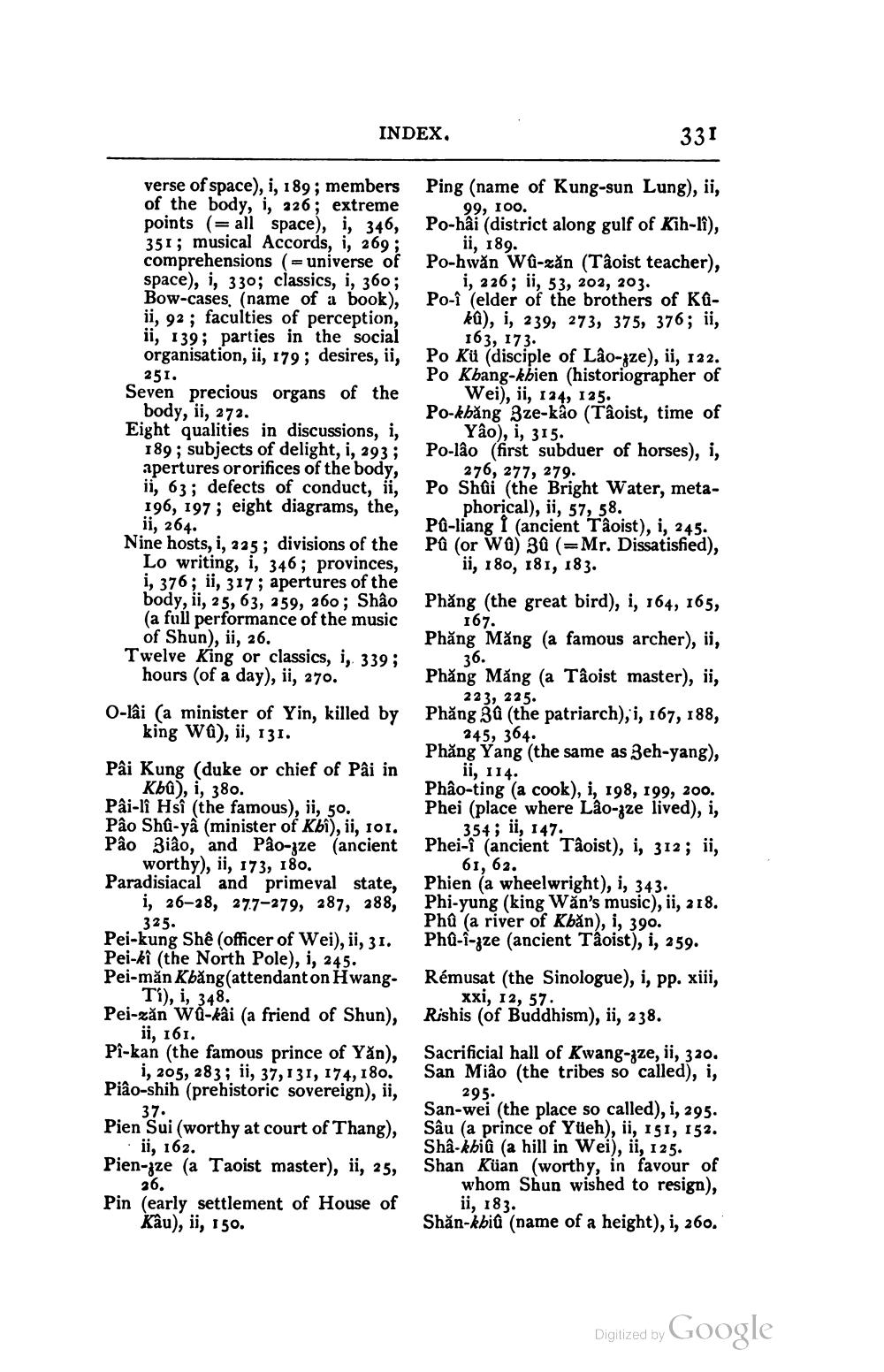________________
INDEX.
verse of space), i, 189; members of the body, i, 226; extreme points (= all space), i, 346, 351; musical Accords, i, 269; comprehensions (= universe of space), i, 330; classics, i, 360; Bow-cases, (name of a book), ii, 92; faculties of perception, ii, 139; parties in the social organisation, ii, 179; desires, ii,
251.
Seven precious organs of the body, ii, 272.
Eight qualities in discussions, i, 189; subjects of delight, i, 293; apertures or orifices of the body, ii, 63; defects of conduct, ii, 196, 197; eight diagrams, the, ii, 264.
Nine hosts, i, 225; divisions of the Lo writing, i, 346; provinces, i, 376; ii, 317; apertures of the body, ii, 25, 63, 259, 260; Shâo (a full performance of the music of Shun), ii, 26. Twelve King or classics, i, 339; hours (of a day), ii, 270.
O-lâi (a minister of Yin, killed by king Wû), ii, 131.
Pâi Kung (duke or chief of Pâi in Kbû), i, 380.
Pâi-li Hsi (the famous), ii, 50. Pâo Shu-ya (minister of Kbi), ii, 101. Pâo 3iâo, and Pâo-zze (ancient
worthy), ii, 173, 180. Paradisiacal and primeval state,
i, 26-28, 277-279, 287, 288, 325.
Pei-kung Shê (officer of Wei), ii, 31. Pei-kî (the North Pole), i, 245. Pei-măn Kbăng(attendanton Hwang Ti), i, 348.
Pei-zăn Wu-kâi (a friend of Shun), ii, 161.
Pi-kan (the famous prince of Yăn), i, 205, 283; ii, 37, 131, 174, 180. Piâo-shih (prehistoric sovereign), ii,
37.
Pien Sui (worthy at court of Thang), ii, 162. Pien-jze (a Taoist master), ii, 25,
331
Ping (name of Kung-sun Lung), ii, 99, 100.
Po-hai (district along gulf of Kih-lî), ii, 189. Po-hwan Wu-zăn (Tâoist teacher), i, 226; ii, 53, 202, 203. Po-î (elder of the brothers of Kûku), i, 239, 273, 375, 376; ii, 163, 173.
Po Kü (disciple of Lâo-ze), ii, 122. Po Kbang-kbien (historiographer of Wei), ii, 124, 125. Po-kbăng 3ze-kão (Tâoist, time of Yào), i, 315.
Po-lão (first subduer of horses), i, 276, 277, 279.
Po Shui (the Bright Water, metaphorical), ii, 57, 58.
Pû-liang (ancient Tâoist), i, 245. Pû (or Wû) 3û (=Mr. Dissatisfied), ii, 180, 181, 183.
26. Pin (early settlement of House of Kâu), ii, 150.
Phăng (the great bird), i, 164, 165, 167.
Phăng Măng (a famous archer), ii, 36. Phăng Măng (a Tâoist master), ii,
223, 225.
Phăng 3u (the patriarch),i, 167, 188, 245, 364.
Phăng Yang (the same as 3eh-yang), ii, 114. Phâo-ting (a cook), i, 198, 199, 200. Phei (place where Lâo-zze lived), i, 354; ii, 147. Phei-i (ancient Tâoist), i, 312; ii, 61, 62.
Phien (a wheelwright), i, 343. Phi-yung (king Wăn's music), ii, 218. Phú (a river of Kbăn), i, 39o. Phû-i-ze (ancient Taoist), i, 259.
Rémusat (the Sinologue), i, pp. xiii, xxi, 12, 57. Rishis (of Buddhism), ii, 238.
Sacrificial hall of Kwang-3ze, ii, 320. San Mião (the tribes so called), i,
295.
San-wei (the place so called), i, 295. Sâu (a prince of Yueh), ii, 151, 152. Shâ-kbiû (a hill in Wei), ii, 125. Shan Küan (worthy, in favour of whom Shun wished to resign), ii, 183. Shăn-kbiû (name of a height), i, 260.
Digitized by Google




